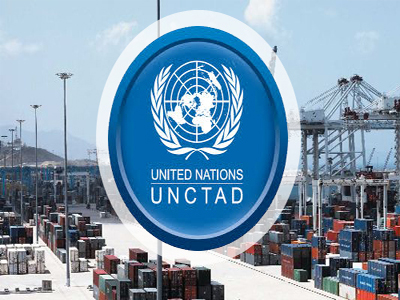The United Nations Conference on Trade and Development (UNCTAD) has highlighted the critical need for nations to increase investments in port infrastructure to combat congestion, boost climate resilience and support seamless cargo movement.
UNCTAD also underscored the importance of streamlining customs processes, enhancing hinterland connectivity, developing transport and transit corridors and establishing dry ports.
Also, it emphasised the need for improved trade and transport facilitation to support intermodal transport connections.
These insights were included in the UNCTAD 2024 Review of Maritime Transport, signed by the Secretary-General of UNCTAD, Rebeca Grynspan.
The organisation stressed that Africa bears the brunt of the Red Sea shipping crisis but is making strides in port and vessel performance, trade facilitation and the clean energy transition.
The report indicated that between the first half of 2018 and the first half of 2023, port calls by container ships rose by 20 per cent in Africa, while tanker calls grew by 38 per cent, both record-breaking increases for the continent.
UNCTAD emphasised that establishing dry ports as inland extensions of seaports can facilitate cargo handling, storage and regulatory inspections away from congested coastal areas, providing significant benefits for trade.
Addressing the urgent demand for improved port and hinterland connectivity, the report highlighted the importance of leveraging digitalisation and automation to streamline cargo-handling operations and enhance public-private partnerships.
The organisation stated that these partnerships are essential for bridging the infrastructure gap and attracting private investments to the sector.
UNCTAD stated that countries can build competitive, climate-resilient port systems by improving connectivity through sustainable investments.
To assess and enhance port performance, UNCTAD advocated for the adoption of globally recognised port indicators, which include integrating digital solutions such as single windows and automated customs processes.
The organisation stressed that streamlining customs and trade compliance can lead to significant efficiency gains.
UNCTAD also suggested the establishment of an authorised operator programme and reducing cargo clearance times to accelerate the movement of goods.
One challenge noted by UNCTAD is managing the high turnaround times for empty containers, which can disrupt operations and increase costs.
According to the report, establishing well-coordinated transport corridors, particularly for landlocked countries, is key to enhancing connectivity and reducing these delays.
The report also proposed that constructing dry ports and inland container depots can provide landlocked nations with inland extensions of seaports for cargo handling and storage, alleviating the strain on coastal ports and enabling smoother regulatory inspections.
UNCTAD further highlighted that intermodal solutions, which integrate various transport modes, are central to achieving seamless cargo transport.
The organisation indicated that using containers in multimodal transport helps reduce port congestion and transit times while lowering costs.
Notably, China’s dry port network and India’s inland container depots exemplify the success of such infrastructure, according to UNCTAD.
While acknowledging the benefits of public-private partnerships, UNCTAD cautioned about the regulatory challenges they present.
The organisation stated that regulators must ensure competitive markets while minimizing obstacles that impede hinterland connectivity, such as restrictive cargo reservation regimes for trucking companies and quantitative restrictions on inland transport.
